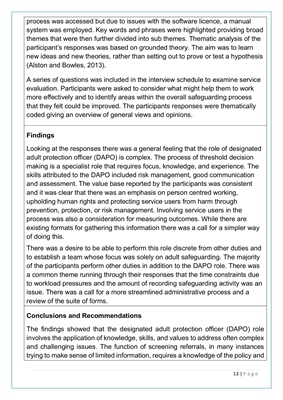
13 | P a g e
process was accessed but due to issues with the software licence, a manual
system was employed. Key words and phrases were highlighted providing broad
themes that were then further divided into sub themes. Thematic analysis of the
participant's responses was based on grounded theory. The aim was to learn
new ideas and new theories, rather than setting out to prove or test a hypothesis
(Alston and Bowles, 2013).
A series of questions was included in the interview schedule to examine service
evaluation. Participants were asked to consider what might help them to work
more effectively and to identify areas within the overall safeguarding process
that they felt could be improved. The participants responses were thematically
coded giving an overview of general views and opinions.
Findings
Looking at the responses there was a general feeling that the role of designated
adult protection officer (DAPO) is complex. The process of threshold decision
making is a specialist role that requires focus, knowledge, and experience. The
skills attributed to the DAPO included risk management, good communication
and assessment. The value base reported by the participants was consistent
and it was clear that there was an emphasis on person centred working,
upholding human rights and protecting service users from harm through
prevention, protection, or risk management. Involving service users in the
process was also a consideration for measuring outcomes. While there are
existing formats for gathering this information there was a call for a simpler way
of doing this.
There was a desire to be able to perform this role discrete from other duties and
to establish a team whose focus was solely on adult safeguarding. The majority
of the participants perform other duties in addition to the DAPO role. There was
a common theme running through their responses that the time constraints due
to workload pressures and the amount of recording safeguarding activity was an
issue. There was a call for a more streamlined administrative process and a
review of the suite of forms.
Conclusions and Recommendations
The findings showed that the designated adult protection officer (DAPO) role
involves the application of knowledge, skills, and values to address often complex
and challenging issues. The function of screening referrals, in many instances
trying to make sense of limited information, requires a knowledge of the policy and